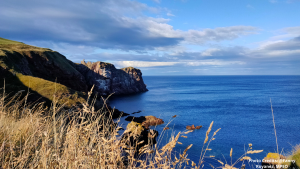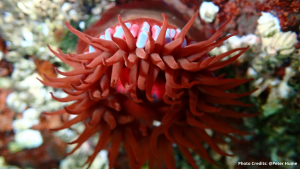The marine environment is one of the UK’s greatest assets. Our seas provide vital ecosystem services, including food provision, protection from storms, nutrient cycling and mitigation of climate change impacts, but ongoing destruction of marine habitats and ecosystems impair their ability to provide these life-sustaining benefits.
For the opening session of Environment Links UK biennial meetings 2021, Scottish Environment LINK invited LINK colleagues and members to reflect on the actions needed to set our part of the global Ocean on a path to recovery.

How to Achieve Ocean Recovery?
Calum Duncan, Head of Conservation Scotland for Marine Conservation Society and Convener of Scottish Environment LINK’s marine group, shed light on the urgent need to deliver recovery of the marine environment.
The ocean is under pressure like never before and, despite a drop in global carbon emissions due to the pandemic, last year ocean temperatures hit a record high, breaking the 2019 record. The most widespread direct human impact in the ocean, globally and in Scotland, is unsustainable fishing practices, impairing the ocean’s ability to help fight climate change when it operates beyond environmental limits. The seas around Scotland, and the UK, are among the most pressurised on Earth and we now know that they are among the most important on Earth for storing blue carbon.
In its Ocean Recovery Plan, Scottish Environment LINK calls for nature recovery targets for land and sea in law. It also supports at least 30% of our seas to be highly protected by 2030, a third of which, so at least 10% of our seas, to be fully protected, through transformation of the MPA network. This ask is consistent with the recent WCL report on achieving 30×30 in England. ScotLINK Ocean Recovery Plan highlights that Scotland’s seabed is in poor condition and that urgent action to reduce pressure of human activities is needed to help ensure the ocean continues to provide benefit for biodiversity, food and blue carbon. Significant investment in proactive ocean restoration, including of blue carbon habitats such as seagrass and native oyster beds, and other nature-based solutions is vital to help reverse the climate and ocean emergencies.
The Scottish Government and Scottish Green Party co-operation agreement includes new commitments to be welcomed. We will engage closely in all processes, keeping supporters updated as to how you can help at strategic moments to ensure urgently needed ocean recovery measures are secured.
The Ocean Recovery plan advocates for a just transition to nature and climate positive, spatially managed fisheries. The co-operation agreement commits to the remaining fisheries management measures for Scotland’s MPA network to be in place by 2024, but this is as already required and included in the 2018 MPA update report to the Scottish Parliament. ScotLINK will push for the most damaging pressures to be excluded from benthic sites, adopting a whole-site management approach where possible, to help meet the 30% highly protected target.
In his presentation, Mario Ray, Project officer for WWF Scotland, highlighted the vital role industries operating in and around the marine environment have in tackling the intertwined climate and nature emergencies. With the UK Joint Fisheries statement currently in progress, now is a key moment to influence policies and ensure that the industry contributes to net zero through the development of climate-smart fisheries. A recent report from WWF, Marine Conservation Society and RSPB describes the ways in which the fishing industry can become climate-smart and contribute to ocean recovery:
- Decarbonise the fleet.
- Protect and support recovery of blue carbon within current MPAs and in key areas outside of MPAs.
- Strengthen marine policy frameworks and include more climate change policy objectives
- Encourage transition towards low impact fishing gear.
- Increase transparency and traceability of fishing by implementing Mandate Remote Electronic Monitoring with cameras that include Vessel Monitoring Systems across vessels fishing in UK waters.
- Research blue carbon and fisheries impact.
Lamlash Bay and Loch Craignish – Scotland’s Recovery Stories
Lucy Kay, MPA project officer at Arran COAST and Danny Renton, project coordinator of Seawilding showcased the incredible stories of community-led restoration projects in Scotland.
The Lamlash Bay No Take Zone (NTZ) was the first Community-led Marine Reserve of its kind in Scotland. Strongly supported by the local community, the No Take Zone (NTZ) became designated in law in 2008, following COAST’s proposal for a marine regeneration trial in 2005. Since then, research demonstrated a clear recovery of the seabed, and marine life has increased by nearly four-fold.
Following a pilot project conducted by CROMACH in 2020, the charity Seawilding was formed to restore the natural beds of the loch Craignish. Situated outside Loch Sunart, an MPA for flapper skate, Loch Craignish is an ideal habitat for native oysters. The project aims to develop community-owned sustainable native oyster fisheries, growing up to 1 million juvenile oysters, and empower communities to be more active stakeholders in fisheries management of inshore waters.
Arran COAST and Seawilding demonstrate what a community-led project can achieve, by using a low-cost approach to encourage other sites to follow and empower local communities. Lucy and Danny reiterated the importance of engaging with people locally.
Going further – What is Holding Ocean Recovery Back?

Despite an apparent impressive MPA network covering 38% of UK seas, Professor Callum Roberts reminded delegates that only about 20% is protected by legally enforceable management measures. The UK is among the leading countries in the world in terms of designating MPAs, but the light levels of protection and management we currently see will not deliver the recovery we so urgently need.
In the MPA Guide, Grorud-Colver et al. (2021). show that only high levels of protection can protect and enhance the marine environment. Completing the MPA management measures is an absolute necessity. As Lucy Kay declared, “we do not have time to delay recovering our seas”. Including the ocean as a solution is vital to tackle climate change, particularly by protecting blue carbon habitats. Ensuring at least 30% of our seas are highly and fully protected, from the surface to the seabed, is essential if the UK nations are to meet net-zero and biodiversity targets.
With the context of our stories, songs and culture deeply embedded not just in Scotland but in coastal and island communities across the UK, how we used our seas in the past and today needs to change for a future under the pressures of the climate emergency and the nature crisis. We need to do things differently – at sea and on land. If we want to see more sea life, fight against climate change, increase our sea food security and build prosperity for future generations, member organisations from the four Links in Scotland, England, Wales and Northern Ireland need to work together, learn from others and implement lessons learnt by what we’ve done in the past and what others are doing. Our marine groups work effectively together to influence policy at country and UK level and in each country, we could be doing more with our coastal communities, who are leading the way on local involvement in ocean recovery and protection.
However, we are clearly running out of time. Both the IPCC and IPBES reports (2019) show, with rigorous scientific underpinning, that we have a decade to change our ways: to limit climate temperature increase below 1.5 degrees and to halt and then reverse the loss of biodiversity. In SELINK’s film, we suggested we need 4 things: legally underpinned nature targets on land and at sea; 30% of our seas under high levels of protection; nature and climate positive fisheries management and investment in ocean recovery.
We’ve heard some examples of what we can do in the nine years we have left. Let’s do it.
Find out more
Scottish Environment LINK Ocean Recovery Plan
Scottish Environment LINK 5 things to know about Ocean Recovery
Scottish Environment LINK Agreement between Scottish Government and Scottish Greens must be next wave in ocean recovery.
Stephenson, S. and Johnson, A.F. (2021) Shifting gears: achieving climate smart fisheries. Published by WWF, RSPB and Marine Conservation Society. Available here
Prof James Harrison (2021), Briefing No. 5 – Strictly Protected Marine Protected Areas: International Policy and National Practice. The University of Edinburgh, Edinburgh Law School and Isle of Arran COAST. Available here
Stewart Bryce D., Howarth Leigh M., Wood Howard, Whiteside Kerri, Carney William, Crimmins Éilís, O’Leary Bethan C., Hawkins Julie P., Roberts Callum M. (2020). Marine Conservation Begins at Home: How a Local Community and Protection of a Small Bay Sent Waves of Change Around the UK and Beyond. Frontiers in Marine Science Vol 7. DOI:10.3389/fmars.2020.00076. Available here
Grorud-Colver et al. (2021). The MPA Guide: A framework to achieve global goals for the ocean. Science vol 373. DOI 10.1126/science.abf0861 available here
